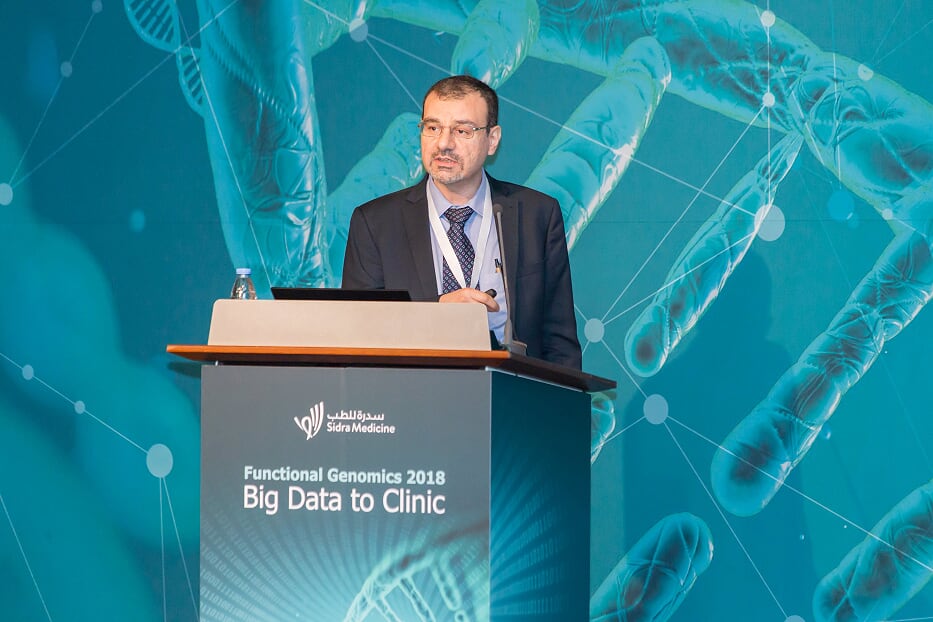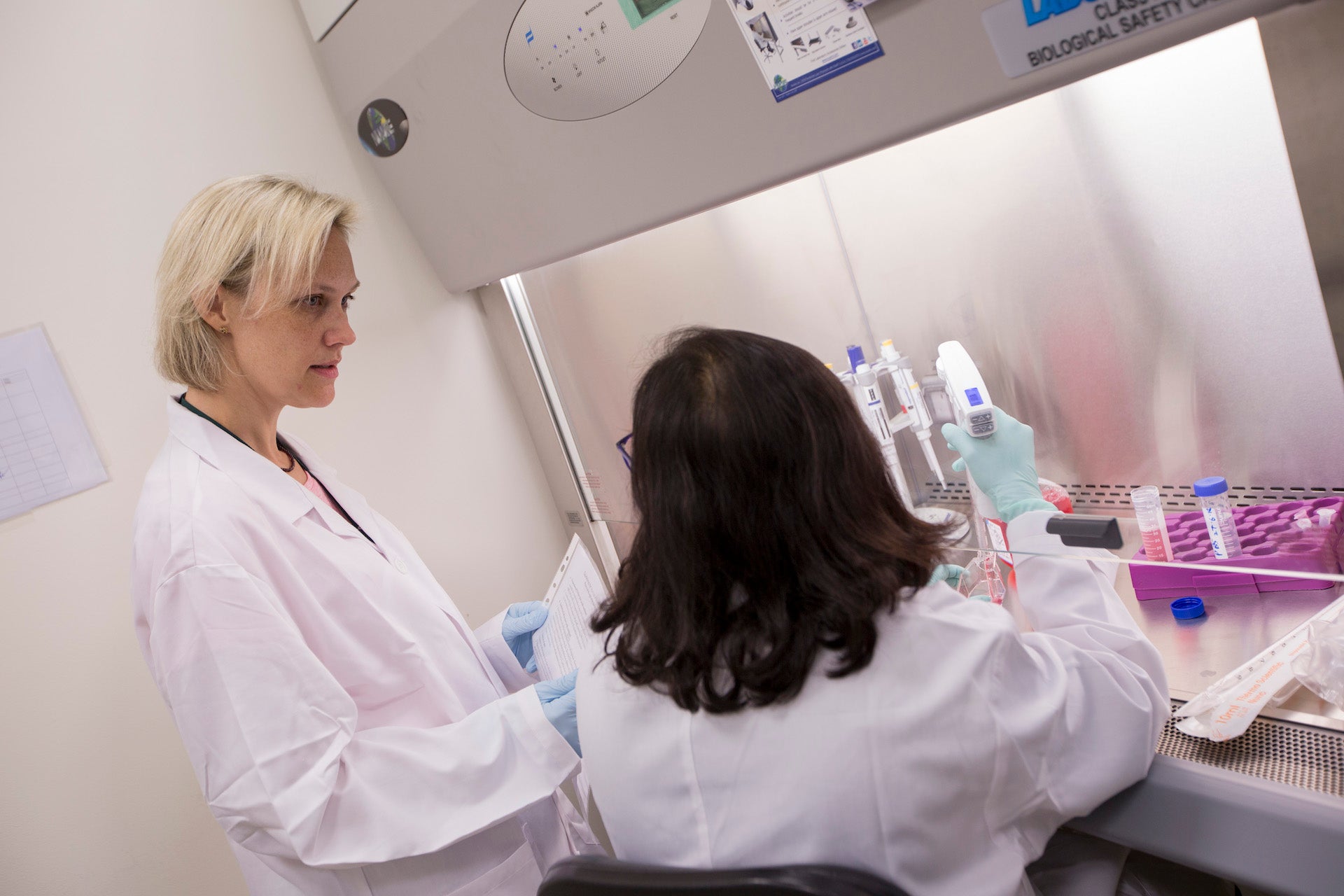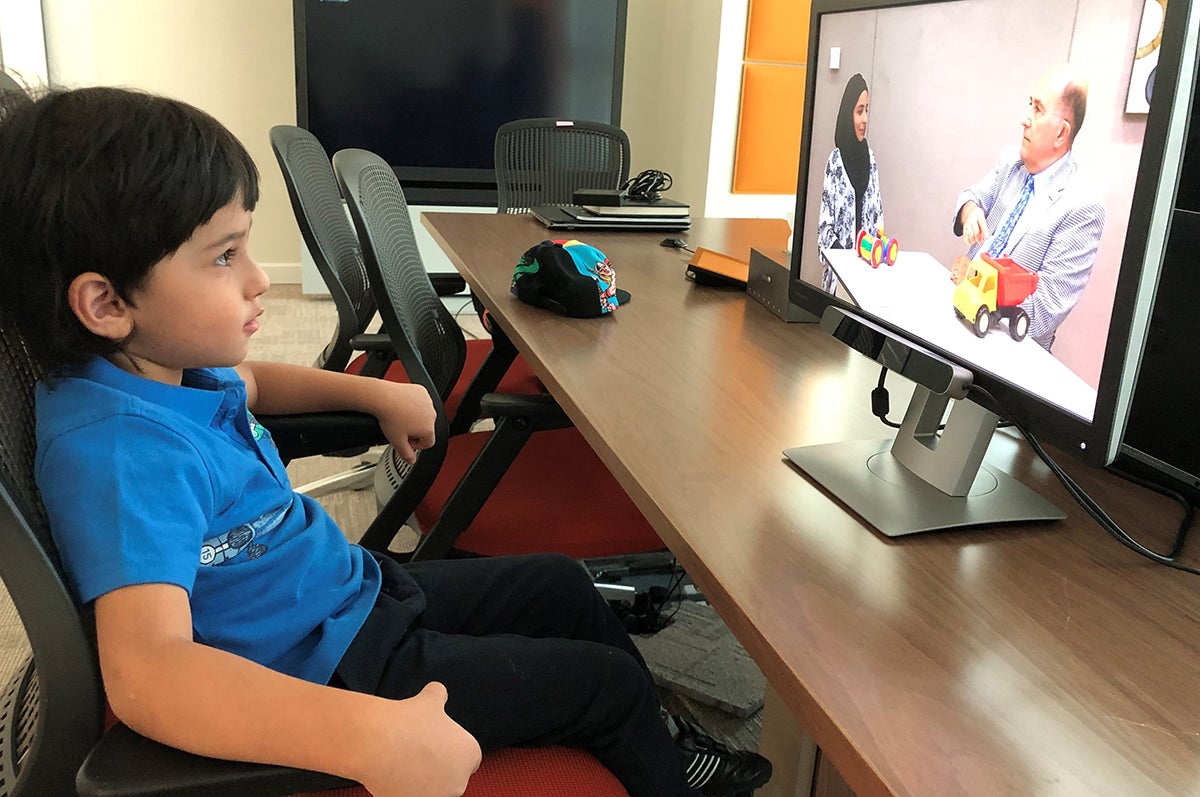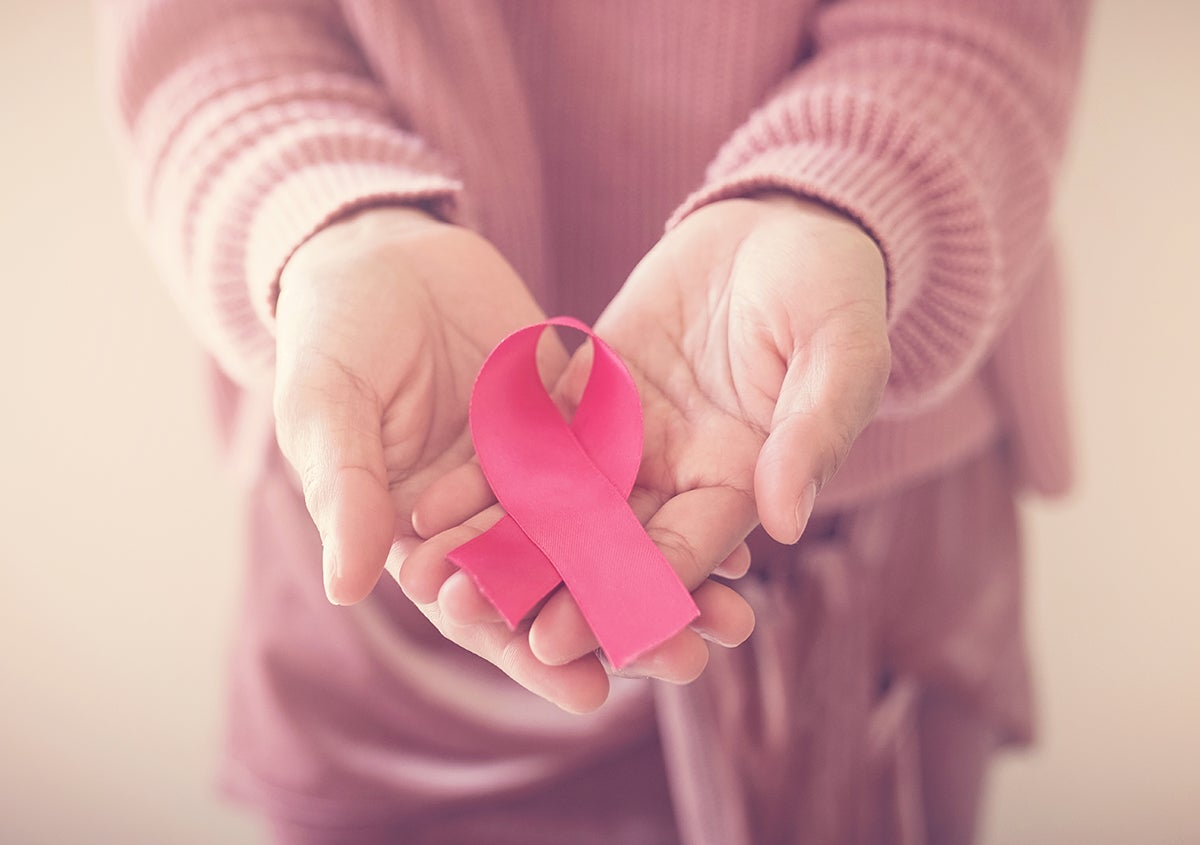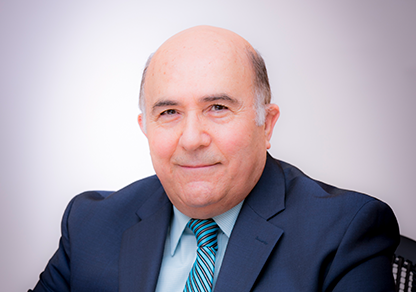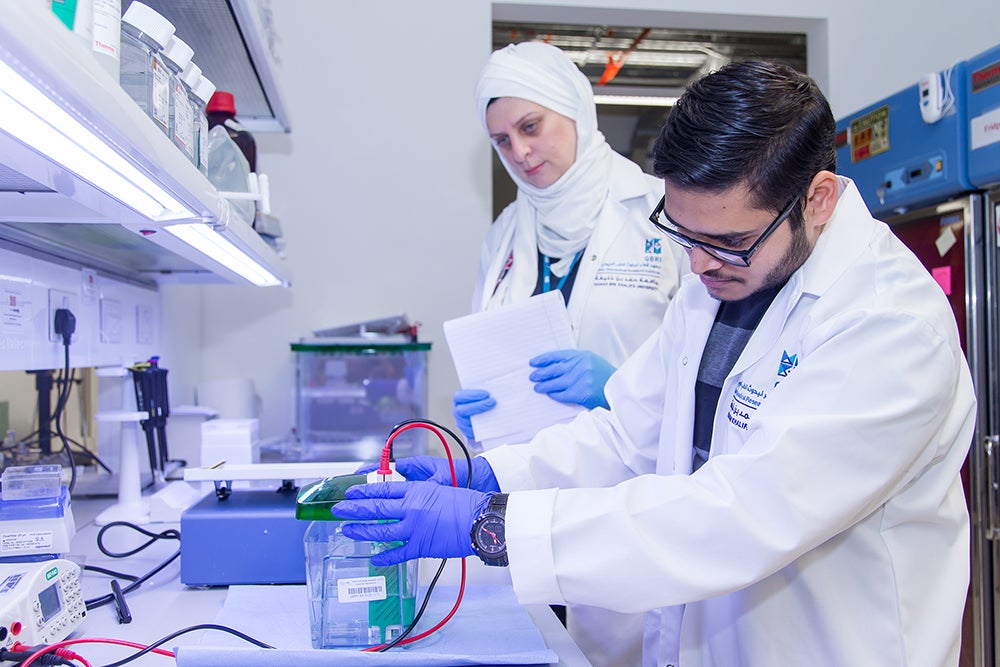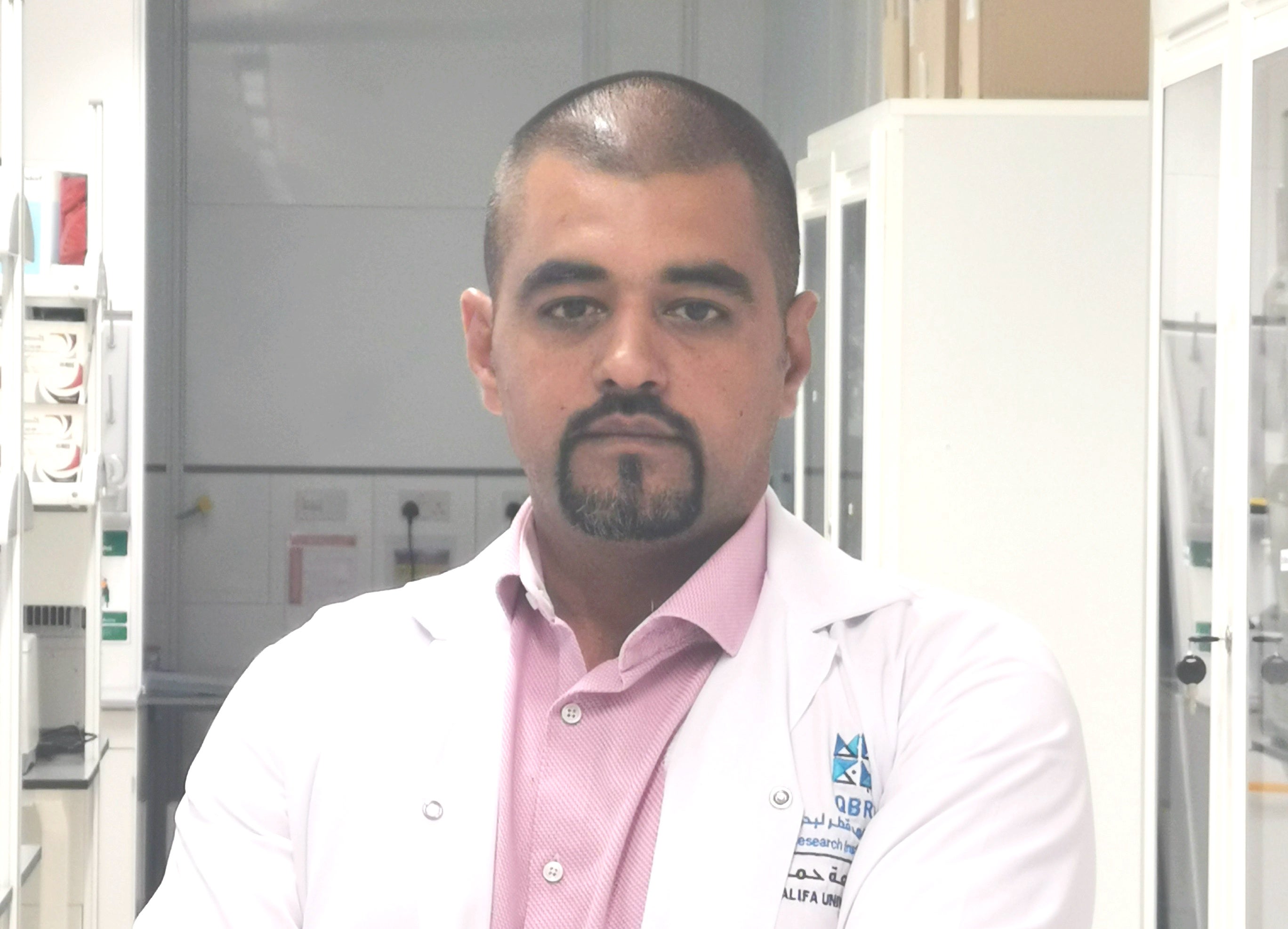
World-Class Research is Gradually Winning the War Against Cancer
World Cancer Day is held annually on February 4 to raise awareness about the disease. Great progress is being made in tackling cancer, and research by Hamad Bin Khalifa University is playing its part.
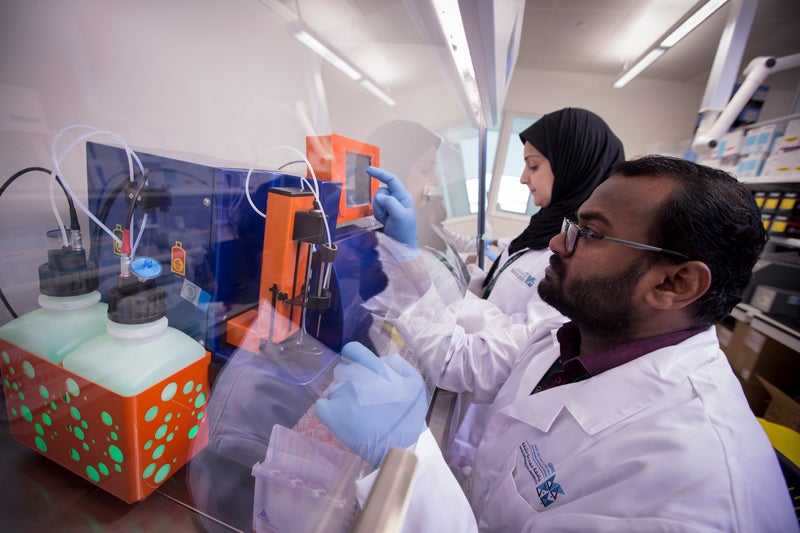
Cancer is one of the key health challenges facing the world today, and is a leading cause of morbidity and mortality. There were 9.6 million cancer-related deaths worldwide in 2018 (https://www.who.int/cancer/PRGlobocanFinal.pdf), and it is one of the health priority areas identified in the Qatar National Research Strategy.
Hamad Bin Khalifa University, a member of Qatar Foundation, is playing an important role in tackling this global challenge, with two of its research institutes and one of its colleges providing cutting-edge research thanks to its state-of-the-art facilities and world-class faculty.
Qatar Biomedical Research Institute (QBRI), Qatar Computing Research Institute (QCRI) and the College of Health and Life Sciences (CHLS) all provide essential research into cancer.
The Qatar Biomedical Research Institute
QBRI’s position as a pioneer in the provision of healthcare solutions was recognized in 2017 when it received the prestigious Arab Best Research Institution award, and the institute is collaborating with Hamad Medical Corporation on cancer research and also signed a research collaboration agreement with King Hussain Cancer Center in Jordan recently.
QBRI’s Cancer Research Center (CRC) is focused on finding essential solutions to the world’s second highest cause of death.
The center focuses on improving diagnosis, prognosis and therapies for cancer patients, with a special focus on breast cancer, which is the most common form in Qatar - accounting for 31 percent of cancer cases in women.
The average age of detection of breast cancer in Arab women is 10 years younger than in their western counterparts. Breast cancer in younger women is also reported to have more aggressive features, so finding solutions to the disease is of huge importance to the region.
One of QBRI’s recent publications merited a mention in one of the oldest, largest and most active immunology societies in the world - the British Society for Immunology - and was listed in the Nobel Prize 2018 Cancer Immunotherapy Collection.
Cancer immunology and immunotherapy is a major area of focus at CRC, and indeed among scientists worldwide. In 2013, cancer immunotherapy - the stimulation of the immune system to treat the disease - was named ‘Breakthrough of the Year’ by peer-reviewed academic journal Science, while in 2018 the Nobel Prize in Medicine was awarded to two prominent scientists (James P. Allison and Tasuku Honjo) for their discoveries in cancer immunotherapy.
QBRI actively seeks to lead the implementation of the national cancer research strategy, and it positions itself as the leading institution in this field. Its research into the underlying causes of breast cancer in Qatar and the region, and its efforts to develop novel and innovative diagnostic and therapeutic strategies, aims to improve the prognosis and survival rates of cancer patients in the country.
Dr. Eyad Elkord, Principal Investigator at QBRI, said: “Over the years, our ability to diagnose and treat cancer has greatly improved. Advances in early detection methods and the availability of different therapeutics have significantly improved prognosis and the overall survival of patients. In recent years, cancer treatment has moved on from the more traditional and aggressive methods such as chemotherapy and radiotherapy onto more targeted and specific therapeutic approaches.
“Research is coming on in leaps and bounds, and there has been much excitement about the recent success of cancer immunotherapy, which is a class of drugs that stimulates the body’s immune system to attack tumor cells.”
Immunotherapeutic approaches have great potentials to fight cancer more effectively, and with fewer side effects than other treatments, although they only work in a small percentage of patients. This is an important area of investigation to increase patients’ response rate.
The Qatar Computing Research Institute (QCRI)
Mohamad Saad, a scientist in statistical genetics and bioinformatics at QCRI, explained: “Not all patients respond well to the same therapy. Research has shown that cells respond or react differently to drugs among people. They also found that patient’s tumors have genetic changes that make the tumor grow, spread or respond to a treatment.
“If we can determine the factors that affect the treatment response rate, we will be able to develop statistical or machine learning models to predict the chance of response to therapies for each patient.”
Raghvendra Mall, a research scientist in data analytics at QCRI, uses Artificial Intelligence (AI) to research cancer. He said: “One of the most efficient ways to combat cancer is through immunotherapy. With the advent of high throughput technologies such as next generation sequencing, it is possible to collect large amounts of data related to cancer in various tissues, such as lung, breast, ovary, brain, etc., and obtain molecular responses of patients suffering from these cancer types.
“At QCRI, we use AI to identify patterns from such data to answer important questions that can ultimately help us make the patients responsive to immunotherapy.
“In collaboration with The Cancer Genome Atlas, we are analyzing data from more than 10,000 patients and over 120 drugs. AI-based tools are indispensable for analyzing such large-scale data. We use deep learning-based methods to predict the drug response for a patient so, if tomorrow a pharmaceutical company produces a new drug, we can predict how effective it would be for patients suffering from different cancers.”
The College of Health and Life Sciences (CHLS)
CHLS offers two master’s programs and two independent PhD programs in Biological and Biomedical Sciences and in Genomics and Precision Medicine, and is helping to produce much-needed cancer biologists.
Omar Khan, Assistant Professor, CHLS, said: “We have state-of-the-art equipment at the college and, in collaboration with QBRI, I can say with total confidence that we have virtually every piece of equipment we need to produce world-class research.
“One in six of the world’s population is predicted to have cancer at some stage, so it is vital that such research is carried out.”
Dr. Khan added: “Modern research has discovered a strong correlation of cancer with genetics and lifestyle, so our behavior and choices can strongly influence whether or not we are prone to cancer. For example, obesity, smoking, alcohol consumption, lack of fruit or vegetable intake, and a lack of physical activity are all risk factors for cancer, as is a family history of cancer, so it is really important to learn as much as you can about preventions and cures.”
Khan believes worldwide research into cancer is paying off, as he explained: “Out of 21 known cancers, 12 have 10-year survival rates of 50 percent or more. Testicular cancer, malignant melanoma, prostate cancer and Hodgkin Lymphoma have survival rates of more than 80 percent, while the stage 1 breast cancer survival rate is also 80 percent. All of this is due to extensive research.”
The fight against cancer goes on, but survival rates are improving all the time, as is quality of life for cancer patients, and that’s all down to the world-class research being conducted at HBKU and elsewhere.
Related News

HBKU’s Qatar Biomedical Research Institute Releases Findings of Pioneering Autism Study

Recent research on the health impact of highly processed foods and drinks and the risk of obesity and diabetes
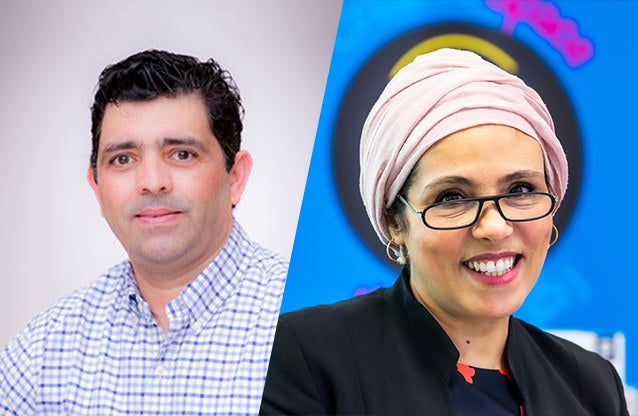
HBKU’s Qatar Biomedical Research Institute and Qatar Computing Research Institute Jointly Publish Risk Tool to Fight Diabetes
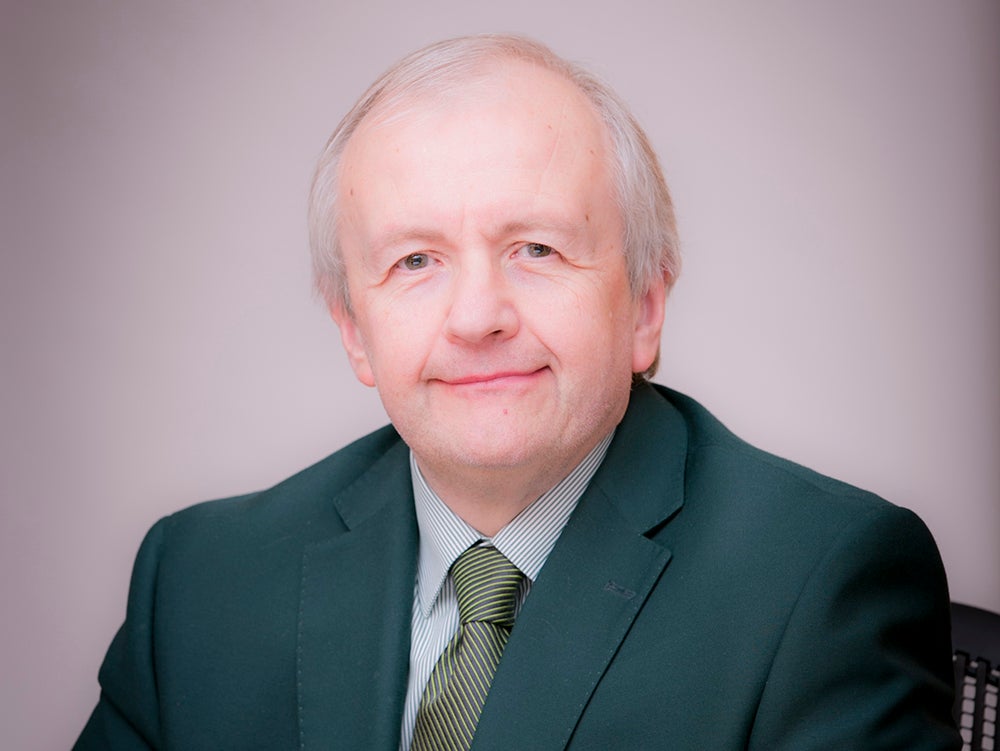
HBKU’s Qatar Biomedical Research Institute Participates in Virtual Diabetes Symposium
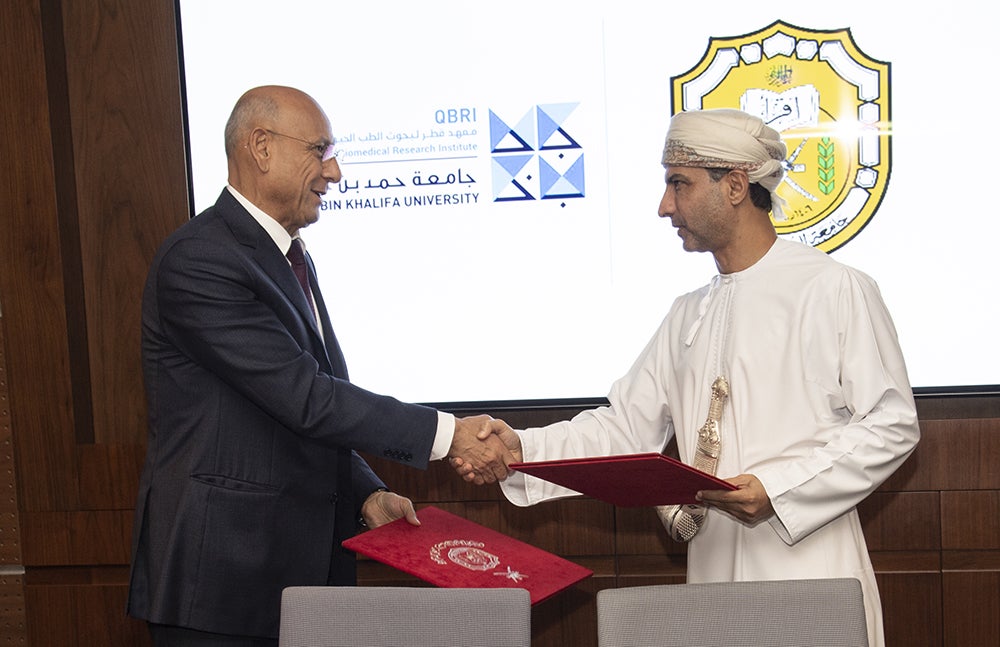
Qatar Biomedical Research Institute to Cooperate with Sultan Qaboos University on Autism Research

HBKU’s Qatar Biomedical Research Institute Releases Findings of Pioneering Autism Study

Recent research on the health impact of highly processed foods and drinks and the risk of obesity and diabetes

HBKU’s Qatar Biomedical Research Institute and Qatar Computing Research Institute Jointly Publish Risk Tool to Fight Diabetes

HBKU’s Qatar Biomedical Research Institute Participates in Virtual Diabetes Symposium

Qatar Biomedical Research Institute to Cooperate with Sultan Qaboos University on Autism Research

HBKU’s Qatar Biomedical Research Institute Releases Findings of Pioneering Autism Study

Recent research on the health impact of highly processed foods and drinks and the risk of obesity and diabetes

HBKU’s Qatar Biomedical Research Institute and Qatar Computing Research Institute Jointly Publish Risk Tool to Fight Diabetes

HBKU’s Qatar Biomedical Research Institute Participates in Virtual Diabetes Symposium

Qatar Biomedical Research Institute to Cooperate with Sultan Qaboos University on Autism Research

HBKU’s Qatar Biomedical Research Institute Releases Findings of Pioneering Autism Study

Recent research on the health impact of highly processed foods and drinks and the risk of obesity and diabetes

HBKU’s Qatar Biomedical Research Institute and Qatar Computing Research Institute Jointly Publish Risk Tool to Fight Diabetes

HBKU’s Qatar Biomedical Research Institute Participates in Virtual Diabetes Symposium

Qatar Biomedical Research Institute to Cooperate with Sultan Qaboos University on Autism Research

HBKU’s Qatar Biomedical Research Institute Releases Findings of Pioneering Autism Study

Recent research on the health impact of highly processed foods and drinks and the risk of obesity and diabetes

HBKU’s Qatar Biomedical Research Institute and Qatar Computing Research Institute Jointly Publish Risk Tool to Fight Diabetes

HBKU’s Qatar Biomedical Research Institute Participates in Virtual Diabetes Symposium

Qatar Biomedical Research Institute to Cooperate with Sultan Qaboos University on Autism Research

HBKU’s Qatar Biomedical Research Institute Releases Findings of Pioneering Autism Study

Recent research on the health impact of highly processed foods and drinks and the risk of obesity and diabetes

HBKU’s Qatar Biomedical Research Institute and Qatar Computing Research Institute Jointly Publish Risk Tool to Fight Diabetes

HBKU’s Qatar Biomedical Research Institute Participates in Virtual Diabetes Symposium

Qatar Biomedical Research Institute to Cooperate with Sultan Qaboos University on Autism Research

HBKU’s Qatar Biomedical Research Institute Releases Findings of Pioneering Autism Study

Recent research on the health impact of highly processed foods and drinks and the risk of obesity and diabetes

HBKU’s Qatar Biomedical Research Institute and Qatar Computing Research Institute Jointly Publish Risk Tool to Fight Diabetes

HBKU’s Qatar Biomedical Research Institute Participates in Virtual Diabetes Symposium

Qatar Biomedical Research Institute to Cooperate with Sultan Qaboos University on Autism Research

HBKU’s Qatar Biomedical Research Institute Releases Findings of Pioneering Autism Study

Recent research on the health impact of highly processed foods and drinks and the risk of obesity and diabetes

HBKU’s Qatar Biomedical Research Institute and Qatar Computing Research Institute Jointly Publish Risk Tool to Fight Diabetes

HBKU’s Qatar Biomedical Research Institute Participates in Virtual Diabetes Symposium

Qatar Biomedical Research Institute to Cooperate with Sultan Qaboos University on Autism Research

HBKU’s Qatar Biomedical Research Institute Releases Findings of Pioneering Autism Study

Recent research on the health impact of highly processed foods and drinks and the risk of obesity and diabetes

HBKU’s Qatar Biomedical Research Institute and Qatar Computing Research Institute Jointly Publish Risk Tool to Fight Diabetes

HBKU’s Qatar Biomedical Research Institute Participates in Virtual Diabetes Symposium

Qatar Biomedical Research Institute to Cooperate with Sultan Qaboos University on Autism Research

HBKU’s Qatar Biomedical Research Institute Releases Findings of Pioneering Autism Study

Recent research on the health impact of highly processed foods and drinks and the risk of obesity and diabetes

HBKU’s Qatar Biomedical Research Institute and Qatar Computing Research Institute Jointly Publish Risk Tool to Fight Diabetes

HBKU’s Qatar Biomedical Research Institute Participates in Virtual Diabetes Symposium

Qatar Biomedical Research Institute to Cooperate with Sultan Qaboos University on Autism Research

HBKU’s Qatar Biomedical Research Institute Releases Findings of Pioneering Autism Study

Recent research on the health impact of highly processed foods and drinks and the risk of obesity and diabetes

HBKU’s Qatar Biomedical Research Institute and Qatar Computing Research Institute Jointly Publish Risk Tool to Fight Diabetes

HBKU’s Qatar Biomedical Research Institute Participates in Virtual Diabetes Symposium

Qatar Biomedical Research Institute to Cooperate with Sultan Qaboos University on Autism Research

HBKU’s Qatar Biomedical Research Institute Releases Findings of Pioneering Autism Study

Recent research on the health impact of highly processed foods and drinks and the risk of obesity and diabetes

HBKU’s Qatar Biomedical Research Institute and Qatar Computing Research Institute Jointly Publish Risk Tool to Fight Diabetes

HBKU’s Qatar Biomedical Research Institute Participates in Virtual Diabetes Symposium

Qatar Biomedical Research Institute to Cooperate with Sultan Qaboos University on Autism Research

HBKU’s Qatar Biomedical Research Institute Releases Findings of Pioneering Autism Study

Recent research on the health impact of highly processed foods and drinks and the risk of obesity and diabetes

HBKU’s Qatar Biomedical Research Institute and Qatar Computing Research Institute Jointly Publish Risk Tool to Fight Diabetes

HBKU’s Qatar Biomedical Research Institute Participates in Virtual Diabetes Symposium

Qatar Biomedical Research Institute to Cooperate with Sultan Qaboos University on Autism Research

HBKU’s Qatar Biomedical Research Institute Releases Findings of Pioneering Autism Study

Recent research on the health impact of highly processed foods and drinks and the risk of obesity and diabetes

HBKU’s Qatar Biomedical Research Institute and Qatar Computing Research Institute Jointly Publish Risk Tool to Fight Diabetes

HBKU’s Qatar Biomedical Research Institute Participates in Virtual Diabetes Symposium

Qatar Biomedical Research Institute to Cooperate with Sultan Qaboos University on Autism Research

HBKU’s Qatar Biomedical Research Institute Releases Findings of Pioneering Autism Study

Recent research on the health impact of highly processed foods and drinks and the risk of obesity and diabetes

HBKU’s Qatar Biomedical Research Institute and Qatar Computing Research Institute Jointly Publish Risk Tool to Fight Diabetes

HBKU’s Qatar Biomedical Research Institute Participates in Virtual Diabetes Symposium

Qatar Biomedical Research Institute to Cooperate with Sultan Qaboos University on Autism Research

HBKU’s Qatar Biomedical Research Institute Releases Findings of Pioneering Autism Study

Recent research on the health impact of highly processed foods and drinks and the risk of obesity and diabetes

HBKU’s Qatar Biomedical Research Institute and Qatar Computing Research Institute Jointly Publish Risk Tool to Fight Diabetes

HBKU’s Qatar Biomedical Research Institute Participates in Virtual Diabetes Symposium

Qatar Biomedical Research Institute to Cooperate with Sultan Qaboos University on Autism Research

HBKU’s Qatar Biomedical Research Institute Releases Findings of Pioneering Autism Study

Recent research on the health impact of highly processed foods and drinks and the risk of obesity and diabetes

HBKU’s Qatar Biomedical Research Institute and Qatar Computing Research Institute Jointly Publish Risk Tool to Fight Diabetes

HBKU’s Qatar Biomedical Research Institute Participates in Virtual Diabetes Symposium

Qatar Biomedical Research Institute to Cooperate with Sultan Qaboos University on Autism Research

HBKU’s Qatar Biomedical Research Institute Releases Findings of Pioneering Autism Study

Recent research on the health impact of highly processed foods and drinks and the risk of obesity and diabetes

HBKU’s Qatar Biomedical Research Institute and Qatar Computing Research Institute Jointly Publish Risk Tool to Fight Diabetes

HBKU’s Qatar Biomedical Research Institute Participates in Virtual Diabetes Symposium

Qatar Biomedical Research Institute to Cooperate with Sultan Qaboos University on Autism Research

HBKU’s Qatar Biomedical Research Institute Releases Findings of Pioneering Autism Study

Recent research on the health impact of highly processed foods and drinks and the risk of obesity and diabetes

HBKU’s Qatar Biomedical Research Institute and Qatar Computing Research Institute Jointly Publish Risk Tool to Fight Diabetes

HBKU’s Qatar Biomedical Research Institute Participates in Virtual Diabetes Symposium

Qatar Biomedical Research Institute to Cooperate with Sultan Qaboos University on Autism Research

HBKU’s Qatar Biomedical Research Institute Releases Findings of Pioneering Autism Study

Recent research on the health impact of highly processed foods and drinks and the risk of obesity and diabetes

HBKU’s Qatar Biomedical Research Institute and Qatar Computing Research Institute Jointly Publish Risk Tool to Fight Diabetes

HBKU’s Qatar Biomedical Research Institute Participates in Virtual Diabetes Symposium

Qatar Biomedical Research Institute to Cooperate with Sultan Qaboos University on Autism Research

HBKU’s Qatar Biomedical Research Institute Releases Findings of Pioneering Autism Study

Recent research on the health impact of highly processed foods and drinks and the risk of obesity and diabetes

HBKU’s Qatar Biomedical Research Institute and Qatar Computing Research Institute Jointly Publish Risk Tool to Fight Diabetes

HBKU’s Qatar Biomedical Research Institute Participates in Virtual Diabetes Symposium

Qatar Biomedical Research Institute to Cooperate with Sultan Qaboos University on Autism Research

HBKU’s Qatar Biomedical Research Institute Releases Findings of Pioneering Autism Study

Recent research on the health impact of highly processed foods and drinks and the risk of obesity and diabetes

HBKU’s Qatar Biomedical Research Institute and Qatar Computing Research Institute Jointly Publish Risk Tool to Fight Diabetes

HBKU’s Qatar Biomedical Research Institute Participates in Virtual Diabetes Symposium

Qatar Biomedical Research Institute to Cooperate with Sultan Qaboos University on Autism Research

HBKU’s Qatar Biomedical Research Institute Releases Findings of Pioneering Autism Study

Recent research on the health impact of highly processed foods and drinks and the risk of obesity and diabetes

HBKU’s Qatar Biomedical Research Institute and Qatar Computing Research Institute Jointly Publish Risk Tool to Fight Diabetes

HBKU’s Qatar Biomedical Research Institute Participates in Virtual Diabetes Symposium

Qatar Biomedical Research Institute to Cooperate with Sultan Qaboos University on Autism Research

HBKU’s Qatar Biomedical Research Institute Releases Findings of Pioneering Autism Study

Recent research on the health impact of highly processed foods and drinks and the risk of obesity and diabetes

HBKU’s Qatar Biomedical Research Institute and Qatar Computing Research Institute Jointly Publish Risk Tool to Fight Diabetes

HBKU’s Qatar Biomedical Research Institute Participates in Virtual Diabetes Symposium

Qatar Biomedical Research Institute to Cooperate with Sultan Qaboos University on Autism Research

HBKU’s Qatar Biomedical Research Institute Releases Findings of Pioneering Autism Study

Recent research on the health impact of highly processed foods and drinks and the risk of obesity and diabetes

HBKU’s Qatar Biomedical Research Institute and Qatar Computing Research Institute Jointly Publish Risk Tool to Fight Diabetes

HBKU’s Qatar Biomedical Research Institute Participates in Virtual Diabetes Symposium

Qatar Biomedical Research Institute to Cooperate with Sultan Qaboos University on Autism Research

HBKU’s Qatar Biomedical Research Institute Releases Findings of Pioneering Autism Study

Recent research on the health impact of highly processed foods and drinks and the risk of obesity and diabetes

HBKU’s Qatar Biomedical Research Institute and Qatar Computing Research Institute Jointly Publish Risk Tool to Fight Diabetes

HBKU’s Qatar Biomedical Research Institute Participates in Virtual Diabetes Symposium

Qatar Biomedical Research Institute to Cooperate with Sultan Qaboos University on Autism Research

HBKU’s Qatar Biomedical Research Institute Releases Findings of Pioneering Autism Study

Recent research on the health impact of highly processed foods and drinks and the risk of obesity and diabetes

HBKU’s Qatar Biomedical Research Institute and Qatar Computing Research Institute Jointly Publish Risk Tool to Fight Diabetes

HBKU’s Qatar Biomedical Research Institute Participates in Virtual Diabetes Symposium

Qatar Biomedical Research Institute to Cooperate with Sultan Qaboos University on Autism Research

HBKU’s Qatar Biomedical Research Institute Releases Findings of Pioneering Autism Study

Recent research on the health impact of highly processed foods and drinks and the risk of obesity and diabetes

HBKU’s Qatar Biomedical Research Institute and Qatar Computing Research Institute Jointly Publish Risk Tool to Fight Diabetes

HBKU’s Qatar Biomedical Research Institute Participates in Virtual Diabetes Symposium

Qatar Biomedical Research Institute to Cooperate with Sultan Qaboos University on Autism Research






